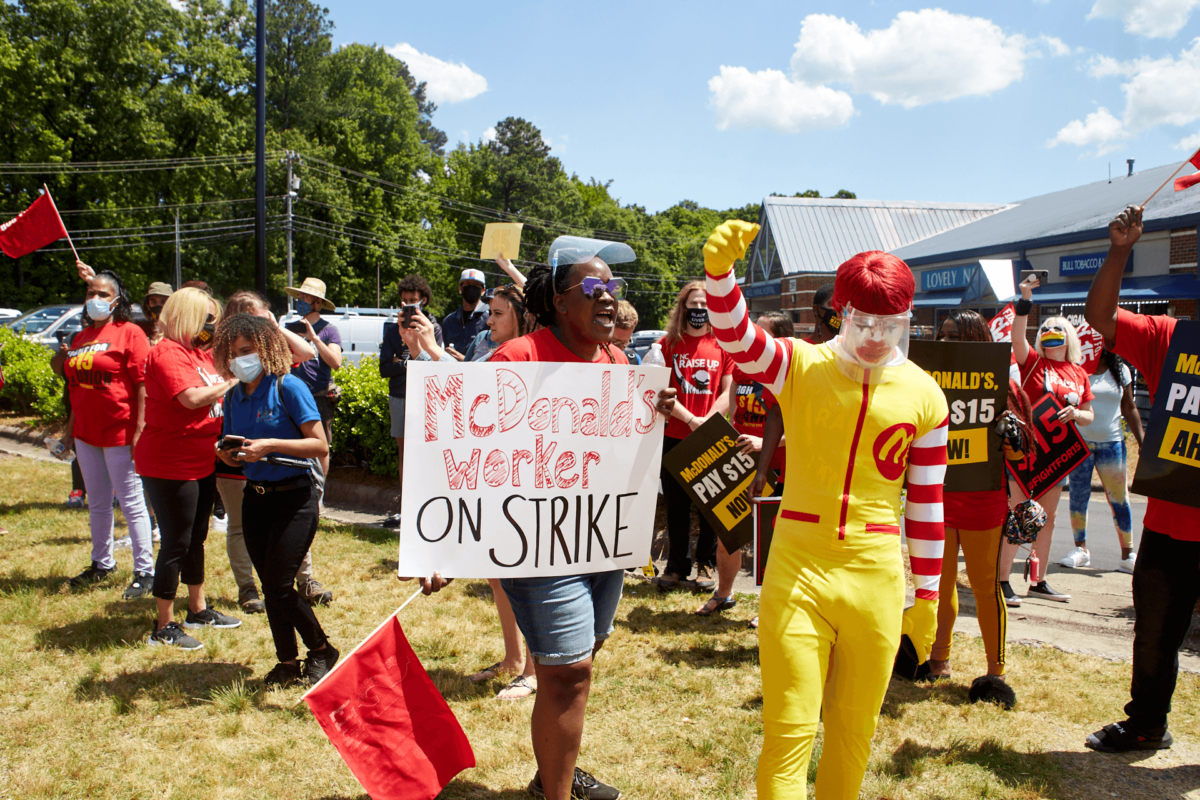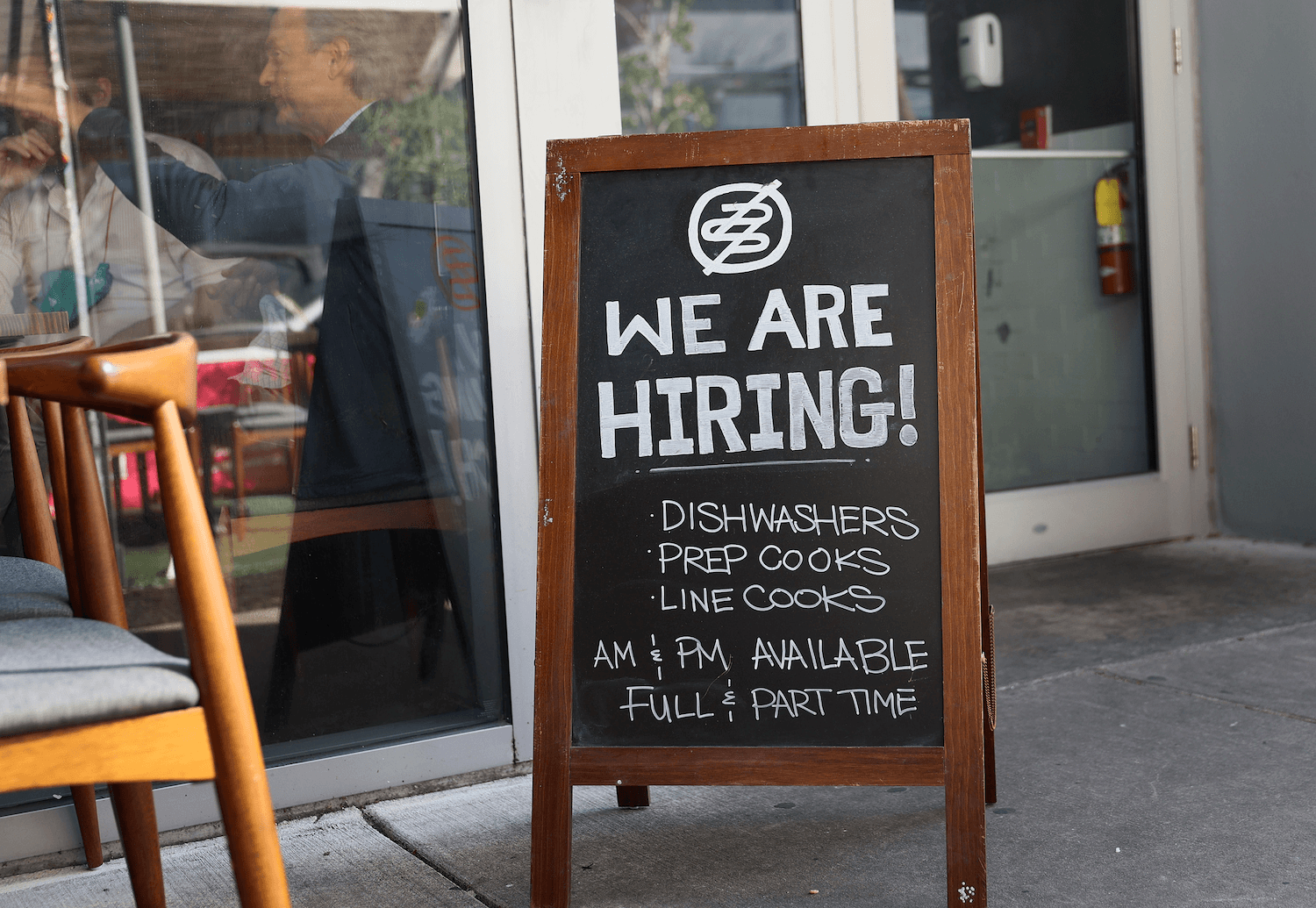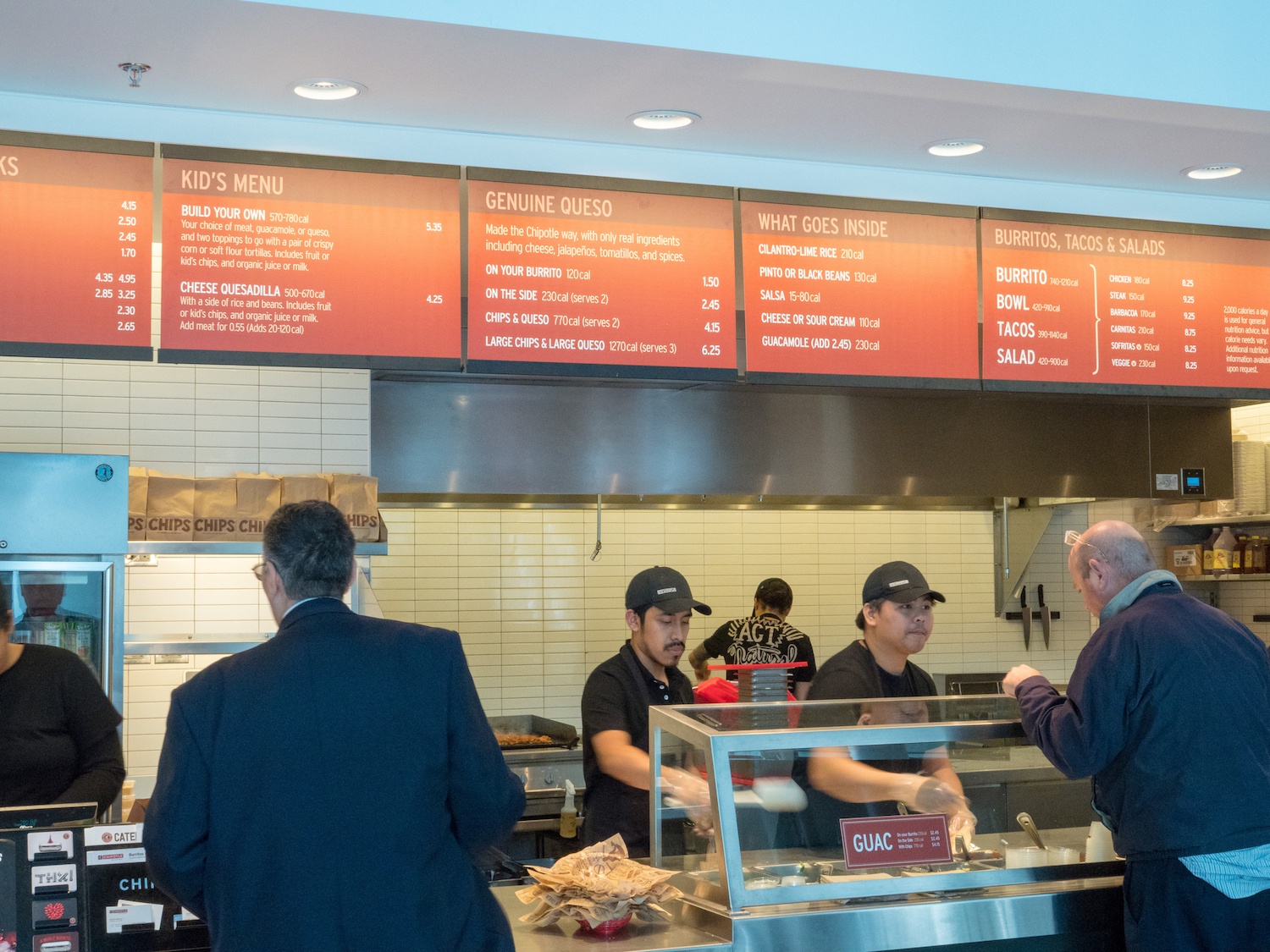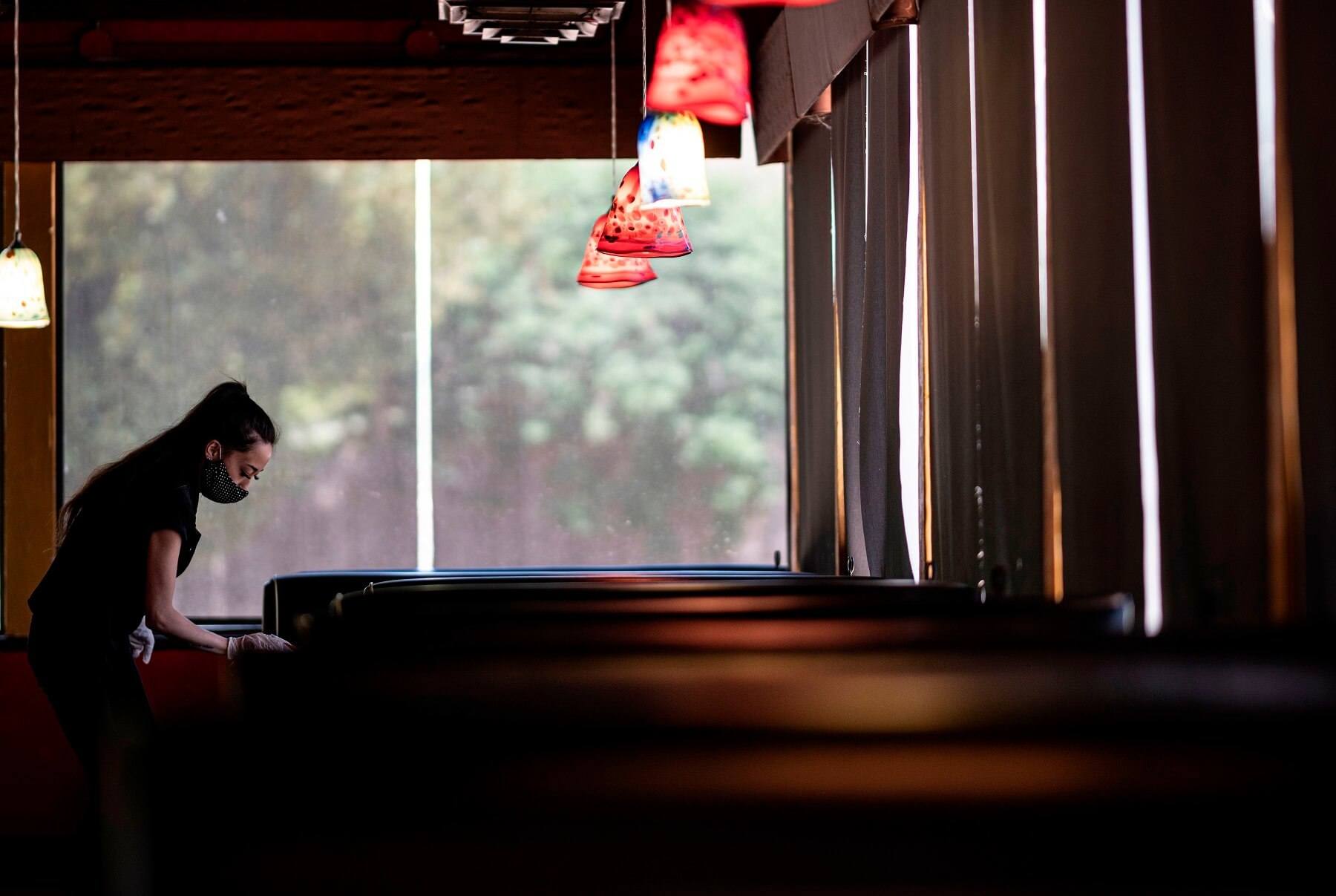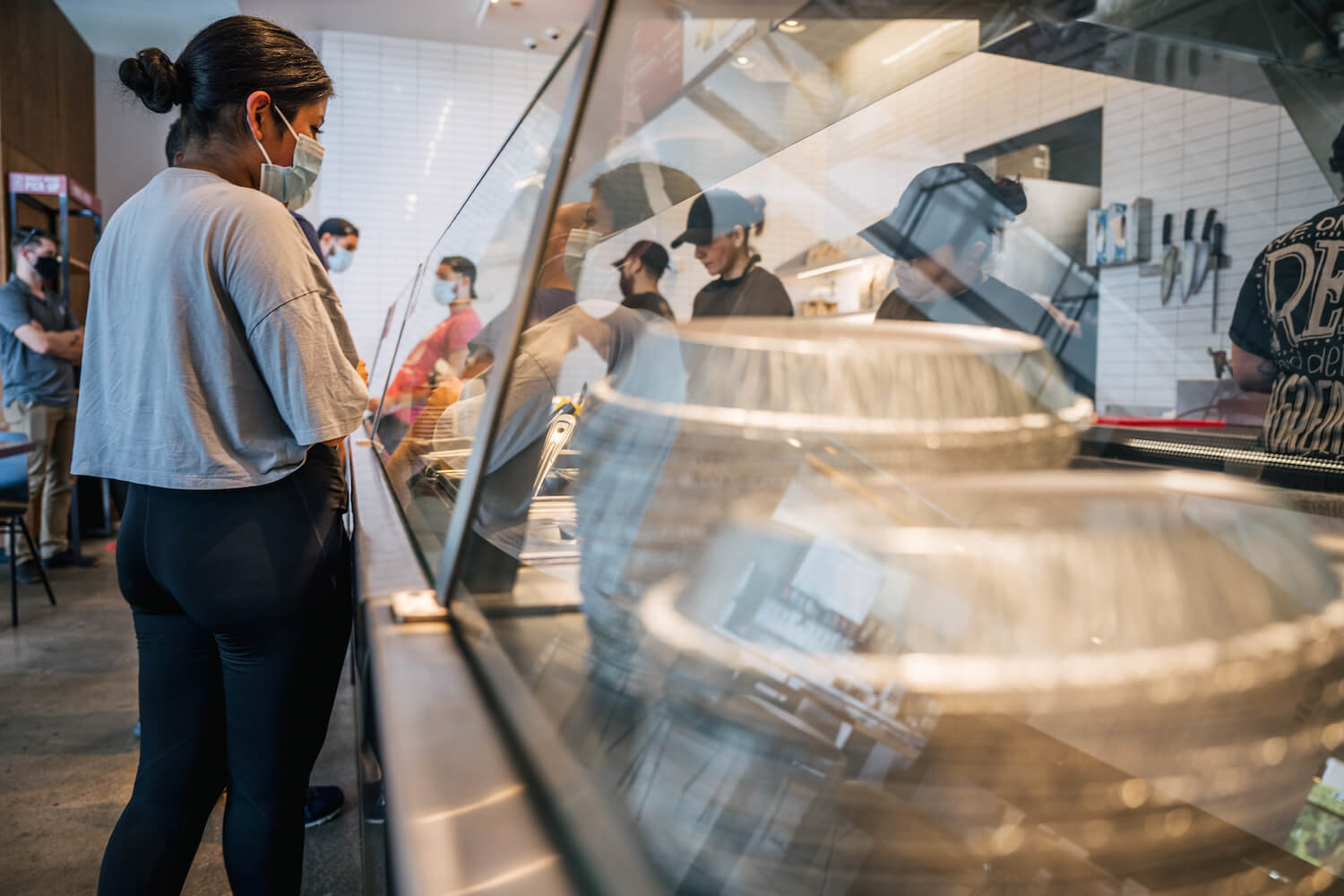
Brandon Bell/Getty Images
New York City fast-food workers have new protections against unfair firings, but restaurant industry groups are fighting back.
In the fall of 2019, Yeral Martinez was stacking boxes inside the walk-in cooler at the Chipotle restaurant in Manhattan where he has worked since 2016 when he felt a shock of pain across his lower back. Martinez, who estimates the boxes he unloaded that morning each weighed between 40 and 60 pounds, reported the injury to a manager and asked to clock out early to seek medical attention.
“She told me I already had two call-outs and to try to stay one more hour,” Martinez recalled, referring to the short-notice absences that managers typically log as part of employees’ attendance records. Martinez finished his shift that day with his body wracked in pain.
Two days later, still recovering from the injury, he called in sick before his scheduled shift. He spoke with two managers about using his accrued sick or vacation time to cover the missing hours. Neither manager indicated it would be a problem, or warned that he risked losing his job, he said. (Chipotle did not return requests for comment on Martinez’s case or the company’s absence policies.)
“I don’t have to give a reason to fire you. I don’t have to provide any explanation.”
“The next day I arrived at 7 a.m. When I went to change, the kitchen manager called me in and said ‘We have to talk.’ Then she told me I was fired,” Martinez remembered. “It felt like I’d been punched in the gut.”
When Martinez asked why he had been let go, his manager responded, “I don’t have to give a reason to fire you. I don’t have to provide any explanation.”
This was true. Martinez’s experience—getting fired without warning, and without a clearly stated reason from his managers—is common practice across the U.S., where at-will employment is the default labor standard for workers who aren’t part of a union or other employment contract. It allows employers to dismiss an employee for virtually any reason, without warning, as long as that reason is not illegal. (Montana is a rare exception; the state’s 1987 Wrongful Discharge from Employment Act requires that employers provide just cause for discharge of employees after a probationary period. Earlier this year, Montana’s Republican Governor Greg Gianforte effectively defanged the law when he signed HB 254, which gives employers more latitude to fire workers.)
For Martinez, the sudden job loss triggered a period of economic instability and hardship that took months to surmount. He was forced to borrow money from family and relied on free meal programs to eat.
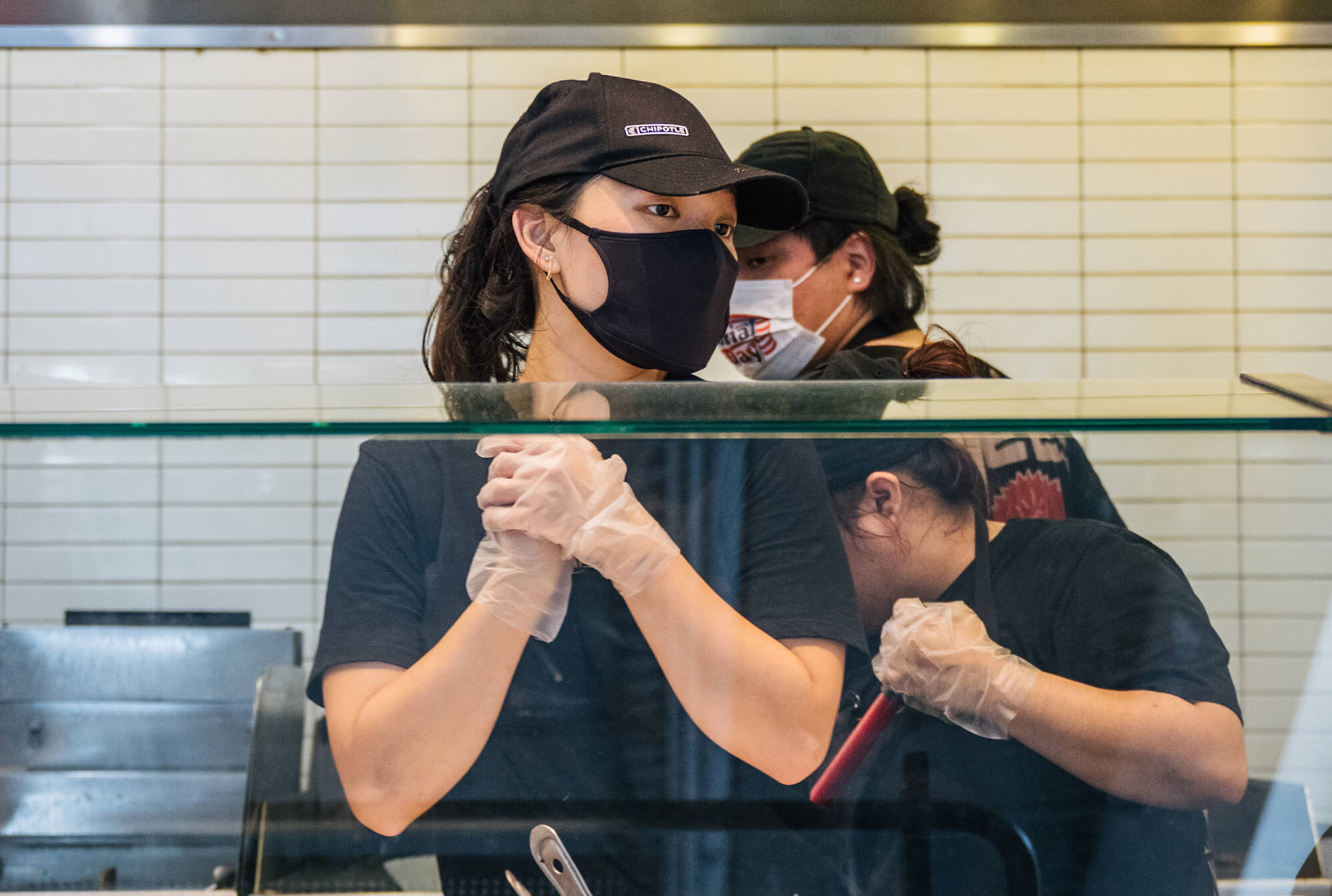
Fast-food workers—a segment of the restaurant industry that in New York City is largely powered by women, immigrants, and people of color—are particularly vulnerable to arbitrary and unfair firings.
Brandon Bell/Getty Images
Martinez eventually won his job back after seeking advice from Local 32BJ, the New York City-based branch of the Service Employees International Union (SEIU) that represents roughly 175,000 property service workers, including office cleaners, security officers and fast-food workers, across 10 U.S. states. Although New York City fast-food workers have been pushing to unionize under Local 32BJ for years, none are currently union members, including Martinez. But Local 32BJ has been a powerful ally and behind-the-scenes resource for workers, providing them with legal and legislative support. Reversing the termination required Martinez to send Chipotle copies of his personal phone records to prove he had made a good-faith effort to report the absence.
Fast-food workers—a segment of the restaurant industry that in New York City is largely powered by women, immigrants, and people of color—are particularly vulnerable to arbitrary and unfair firings. In a survey of 539 New York City fast-food workers, 65 percent of workers who reported being fired in at least one instance said they had not been given a reason for the termination, according to a 2019 report from the National Employment Law Project (NELP), the Center for Popular Democracy, 32BJ SEIU, and Fast Food Justice.
On July 5, two new laws went into effect in New York City that aim to protect workers like Martinez from being fired without a legitimate cause, and allow them to appeal firings through arbitration. The so-called “just cause” laws prohibit fast-food chains from terminating, suspending, or reducing employees’ hours by more than 15 percent without evidence of demonstrated misconduct or poor performance, or without a “bona fide economic reason.”
Chipotle is currently facing a $150 million lawsuit brought by the City of New York in April 2021 alleging widespread violations of the laws between 2017 and 2019, including changing employees’ schedules without notice, failing to provide employees their premium payments, and for violating the city’s sick-leave laws.
Fast-food chains that fall under the purview of the new laws must provide employees with a progressive discipline policy and a written explanation with the “precise reasons” for termination or hours reduction. In cases where companies lay off workers for legitimate business reasons—downsizing due to a turndown in foot traffic, for instance—termination or hours reduction must be carried out in reverse seniority order. The laws represent the latest victory for New York City fast-food workers, who have led the way nationally in securing improved working conditions and greater job security for a historically marginalized workforce. New York City’s fast-food workers were among the first in the country to stage rallies for raising the hourly minimum wage to $15.
In 2017, workers-rights groups won a major victory with the passage of New York City’s Fair Workweek laws, a sweeping legislative package that gave fast-food and retail workers greater stability and predictability in their work schedule. The Fair Workweek laws require employers to provide work schedules in advance, give current employees priority in working shifts that become available, and pay workers a premium when their schedules are changed at the last minute, or when they are provided with less than 11 hours rest between scheduled shifts. Chipotle is currently facing a $150 million lawsuit brought by the City of New York in April 2021 alleging widespread violations of the laws between 2017 and 2019, including changing employees’ schedules without notice, failing to provide employees their premium payments, and for violating the city’s sick-leave laws. The complaint is an addendum to a similar September 2019 suit, which alleged violations at a handful of Chipotle stores and sought $1 million in fines and restitution. In a statement made to the New York Times earlier this year, Lorelai Salas, then-commissioner of the Department of Consumer and Worker Protection, which filed the suit, said further investigations revealed that the violations outlined in the 2019 suit were “just the tip of the iceberg,” and “the pervasiveness of Chipotle’s complete disregard for the city’s Fair Workweek Law extends to every aspect of the law in every corner of our city,” Salas told the Times.
Even with growing support for policies that benefit low-wage workers, setting and upholding standards in the fast-food industry represents an enormous challenge: The industry is heavily franchised, most workers are not unionized, and it is plagued by stunningly high turnover rates—some restaurant chains report turnover rates as high as 130 to 150 percent annually. In other words, many fast-food restaurants lose their entire staff, plus half of the people hired to replace them, every year.
“Essential fast-food workers in New York City have been the victims of arbitrary termination and unfair reduction of hours, which was only exacerbated by Covid-19. They are predominantly immigrants or women of color who face discrimination and racism in their communities and at work.”
The high turnover is symptomatic of the “churn and burn” culture that has normalized the physically and emotionally demanding nature of fast-food work, and a business model where cycling through thousands of employees every year is built into the bottom line. Many people leave fast-food work for jobs with better pay and career advancement opportunities, but the high turnover rates also reflect how commonplace it is for managers to fire workers for small or dubious infractions.
News reports are rife with anecdotal examples, especially in the past year and a half, as the Covid-19 pandemic turned fast-food workers into front-line “essential workers” almost overnight. In past months, for instance, fast-food employees have been fired for allegedly asking their employers to provide face masks and other safety protocols, for not smiling enough on the job, or for speaking publicly about their working conditions during the early months of the pandemic.
“Essential fast-food workers in New York City have been the victims of arbitrary termination and unfair reduction of hours, which was only exacerbated by Covid-19. They are predominantly immigrants or women of color who face discrimination and racism in their communities and at work,” said New York City Council Member Adrienne Adams, co-sponsor of the legislation, in a statement to The Counter.
While it’s illegal for employers to fire or retaliate against employees for a number of reasons—raising safety concerns, or for trying to unionize, or on the basis of race, gender, nationality or religion, for example—these protections are difficult to enforce. And workers fired without legitimate cause have historically been left to carry the burden of proof.
“Rather than pursue an established path to unionization under the National Labor Relations Act, the Service Employees International Union (SEIU) has chosen to do an end-run around federal labor standards.”
New York City’s just cause laws are remarkable because they effectively overturn the U.S. standard of at-will employment, often thought of as a fundamental feature of the American economy, but which most legal scholars agree is traceable not to Congress or any state legislature, but rather to the vagaries of 19th-century U.S. case law. The laws also upset the traditional power dynamic between fast-food restaurants and their workforce. Not surprisingly, restaurant industry groups are fighting back.
On May 28, the Restaurant Law Center and the New York State Restaurant Association—industry groups that represent the interests of fast-food and fast-casual giants such as KFC, Pizza Hut, Taco Bell, Red Lobster, Chili’s, Chipotle and many others—filed suit against the City of New York in the Southern District of New York. The pre-trial conference is set for September of 2021. In the complaint, the restaurant industry groups argue that New York City’s just cause laws are preempted by federal and state law, and seek to “evade” the National Labor Relations Act by providing union-style protections to workers who are not in unions.
“Rather than pursue an established path to unionization under the National Labor Relations Act, the Service Employees International Union (SEIU) has chosen to do an end-run around federal labor standards,” said Angelo Amador, executive director of the Restaurant Law Center, in a press release. “Through the City Legislature, SEIU seeks to overturn the state’s longstanding doctrine of at-will employment, and, instead, impose onerous procedural rules that go to the heart of collective bargaining agreements in unionized workforces.” (The Restaurant Law Center and New York State Restaurant Association did not return requests for comment).
New York’s Fair Workweek laws were similarly challenged by restaurant industry groups, but have so far withstood legal challenges. “We don’t believe there’s any basis to the restaurant industry’s argument that New York’s just cause law violates the National Labor Relations Act,” said Paul Sonn, the state policy program director at the National Employment Law Project. The New York-based research and worker advocacy group helped advise the New York City Council on the just cause legislation. “The federal appeals court already rejected this argument when they ruled on and upheld the just cause law in the U.S. Virgin Islands,” said Sonn. “It’s been long established that cities and states may regulate minimum labor standards and that such standards are not preempted by the NLRB.”
Will New York City’s just cause laws inspire similar legislation in other U.S. cities or states?
New York City’s just cause laws represent the biggest movement to “rein in” the doctrine of at-will employment in the U.S. in three decades, said Sonn, who credits the destabilizing force of the pandemic with setting the stage for a fundamental shift in the relationship between workers and bosses. “The pandemic really put into sharp relief the need for greater protections against unfair firings, especially as we’ve seen whistleblowers at companies from nursing homes to Amazon all facing firing and retaliation when they’ve spoken up about dangerous work conditions,” he said. “I think it’s really highlighted the need for further protections against unfair firings and it’s really helping build momentum.”
At-will employment is not the standard in most advanced countries. The Organization for Economic Cooperation and Development (OECD), an international data and research group made up of more than 30 advanced and advancing nations, noted in its 2018 annual report that the U.S. ranked dead-last in terms of employee protections. The U.S. and Mexico were the only two countries in the study where employers don’t have to give advance notice for individual firings.
Now the question is: Will New York City’s just cause laws inspire similar legislation in other U.S. cities or states? There are currently efforts in Illinois to establish just cause laws. In California, where only farm workers earn lower wages than fast-food workers, Assembly Member Lorena Gonzalez introduced the Fast Recovery Act in January 2021, which would create a statewide fast-food sector council to help set and raise standards for workers in the industry.
Outside of the nation’s legislative halls, the movement for better working conditions in fast-food restaurants is being carried out on the ground by people like Teodora Flores, who helped deliver the text of New York City’s just cause legislation to City Hall in January of this year, where it was signed into law by Mayor Bill de Blasio. Flores has been a crew member at a Chipotle restaurant on Manhattan’s Fifth Avenue since 2018. Getting a job at the fast-casual Mexican restaurant chain was supposed to be a step up in terms of job security and working conditions. Previously, Flores worked with a staffing agency that frequently dispatched her to late-night or pre-dawn shifts at various packing houses.
“I wanted to learn my rights. I wanted to learn the new laws that required them to pay us premiums if our schedule changed. But managers won’t give you even two minutes of their time.”
Flores swore off night work in 2018, after she was physically assaulted near her apartment in Queens around 3 a.m. on her way to her job prepping meal-kit boxes at a local warehouse. Shortly after that incident, a friend told her that Chipotle was hiring and she applied in earnest. Flores’ hope for a rewarding career with the fast-casual giant quickly soured. She describes a toxic work environment dominated by ill-trained managers who frequently pressure employees to work faster in understaffed restaurants. Time-consuming tasks meant for two workers—such as traditional prep, or grill duty—are frequently foisted on one over-stressed worker, she said. (Chipotle did not respond to a request for comment on these allegations.)
Flores checked herself into the hospital twice for injuring her sciatic nerve after particularly grueling shifts. She said that she started to attend worker rallies in 2019 to learn more about the recently enacted Fair Workweek laws, in part because managers never properly explained the laws to crew members.
“I wanted to learn my rights. I wanted to learn the new laws that required them to pay us premiums if our schedule changed,” said Flores. “But managers won’t give you even two minutes of their time.”
Flores only found out the restaurant was supposed to be paying premiums for last-minute scheduling changes from a co-worker, who helped her translate a posted announcement into Spanish so she could read it. Flores’ manager often asked her to stay 30 minutes or one hour past the end of her shift, but rarely added the extra time to her pay sheet, she said. When she gathered the courage to complain about not getting paid the premiums she was due, Flores said the manager retaliated by cutting her work hours.
“I used to be scared of getting fired. But I’m not scared anymore. If we speak up, we can improve working conditions for everyone.”
“If you don’t like it, you can leave it,” the manager said.
The new just cause laws have made her a less fearful employee. “I used to be scared of getting fired,” Flores said. “But I’m not scared anymore. If we speak up, we can improve working conditions for everyone.”
For Yeral Martinez, the worker who fought Chipotle to win his job back, the just cause laws represent a ray of light in a corner of the restaurant industry where workers are too often treated as disposable workhorses.
When he was abruptly fired, he fought to get his job back because he felt it was wrong for someone to lose their livelihood without good cause. He wanted to show his family and colleagues that it was possible to stand up to a corporation. He also wanted to send a message to Chipotle about a worker’s right to be terminated fairly.
“I wanted to get my old job back to show them that they can’t treat people this way. We are human beings. We shouldn’t be treated this way,” Martinez said. “My opinion is that these laws will help a lot. They should have been in place years ago. If these laws had been in place two or three years ago, I wouldn’t have gotten fired for ‘una simpleza.’”
Roughly translated: “I wouldn’t have gotten fired over nonsense.”

